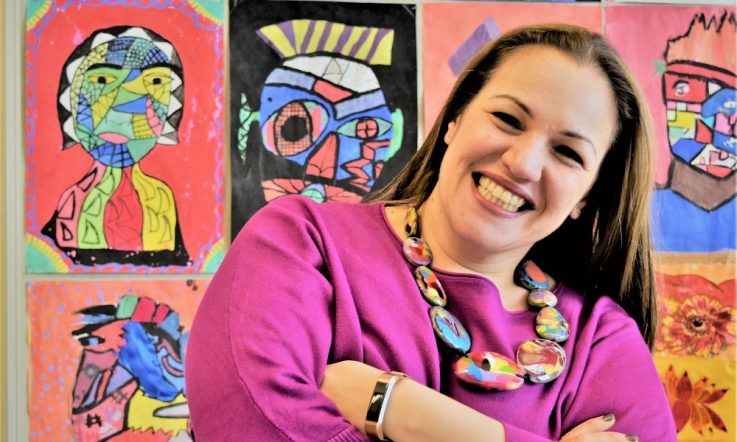This podcast from Teacher magazine is supported by EnhanceTV. EnhanceTV streams thousands of movies, documentaries and clips aligned to the curriculum. EnhanceTV is a not-for-profit and provides affordable screen resources from the world's best producers. School trials are free in Term 1 so visit enhancetv.com.au/trial
Hello and thank you for downloading this School Improvement podcast from Teacher magazine. I'm Rebecca Vukovic. And just a reminder, you can subscribe to our podcast channels on both iTunes and SoundCloud by clicking on the links in the transcript for this podcast.
My guest today is someone I originally discovered on Twitter. Craig Heeley is an educator living in Newcastle upon Tyne in northeast England, and this year he landed his first ever Head Teacher role at Lemington Riverside Primary School. Over the past few months, he's been sharing his experiences in the new Head Teacher role on Twitter, and he's been mustering up lots of engagement and encouragement from educators around the world that are keen to follow his journey.
I catch up with Craig in today's podcast to talk more about the strategies he's employed to get to know the staff, parents and students in his school community. We also chat about navigating challenges as a school leader, the role of mentoring and what he's looking forward to most about the coming year.
Before we launch into the discussion though, I ask Craig to give listeners a brief overview of his career as an educator and how he came to be Head Teacher at Lemington Riverside Primary School. Here's Craig.
Craig Heeley: I started teaching in 2007. I originally came into teaching from a different background. I was going to be a town planner, but did a placement in a school and loved it from day one. So, in terms of my teaching career, I've worked at two schools previously – very contrasting schools. A large, inner city school in Newcastle upon Tyne in England, there were over 500 children. On the contrast to that, a really small school with 80 children in the Midlands of England, in a former industrial village. So, two very different experiences and I was Deputy Head Teacher at both of those schools. And then, obviously, the last few months, I started to look towards my first headship and the job at Lemington Riverside came up and it was an exciting prospect for me. So that's kind of the journey so far.
Rebecca Vukovic: And could you tell me a little about the context of the school and I guess the wider school community as well?
CH: Lemington Riverside is a medium-sized school, 145 children at the moment aging from Nursery up to Year 6 – so 10- and 11-years-old. It's in a suburb in the west end of Newcastle upon Tyne. It's an interesting building, it's a very old building, a Victorian-aged building. It's a challenging site in terms of we don't have any grass, we're kind of surrounded by terraced rows of houses so it's going to be a place we're going to be really creative with, but it's got a lot of character. But also a building of that age comes with challenges as well.
In terms of the school itself, [the] previous Head Teacher was at the school for almost 20 years and it's got a very experienced staff team. So I think me coming in as a new Head is a big change for everyone, which is exciting I think for people but also at the same time a little bit daunting. In terms of the school itself, it's part of a Trust of schools that work very closely together so they've got quite a good network built up and are very supportive of each other.
RV: Fantastic. And Craig I want to read a tweet out that you published a few weeks ago. So I'll read it aloud to listeners. You said: ‘Meeting with every member of staff in the school on a one-to-one basis this week: teachers, TA's, cleaners, cooks, caretaker, admin staff, dinner staff ... all offering an invaluable perspective of what our school does well & where we need to improve.' Why did you decide to hold these one-to-one meetings?
Meeting with every member of staff in the school on a one-to-one basis this week: teachers, TA's, cleaners, cooks, caretaker, admin staff, dinner staff... all offering an invaluable perspective of what our school does well & where we need to improve.
— Craig Heeley (@HeadteacherMrH) January 9, 2019
CH: Well, firstly it's kind of going back to what I said before in terms of the fact that they had a Head Teacher for a lot of years before. Many of the staff had been there throughout this Head Teacher's time at the school. So it was partly that I thought it was important that they got to know me on a one-to-one basis rather than in a large group, so that they felt more comfortable to kind of talk and ask questions. I think as well, I think it's really important that everybody at the school knows that they're part of the team and that they're all valued and that they all play a massive role to ensure that our children get the best experience when they're at school.
I think as leaders, the school leaders, we make important decisions, we make the big decisions but everybody else has got to play their part and if they don't do their job or if they don't feel valued and they don't feel included, then I don't think we're going to give the best deal to our children. And in terms of the one-to-one conversations, I was really keen to get everybody's unique perspective on what our school does well, where we might do things differently or better. And that's exactly what they did.
They gave me kind of glimpses into what they value about our school, what they think we do really well, but also things we could do better. And it was great because a lot of the things that they came up with were things, especially the issues, are things that I felt ‘that might be a quick win, we can address that pretty swiftly'. So you know, for example, with teaching assistants – a lot of them asked if they could have performance management like the teachers did because they thought they didn't necessarily know what they were doing well or where they could improve. Communication was mentioned by quite a few members of staff, so straight away, quick wins like setting up a central, electronic diary and staff briefings every Monday morning. Lunch time staff, in particular, were invaluable because most of them live on the doorstep of the school in the immediate community, and they were able to offer me a very frank, open and honest opinion of the opinions of our school from the local community, which was very, very, very valuable. Again [it] enabled me to see some of the things that our community are concerned about the school. And some of the things they think we're doing well. To me it was really important because like I say, I think within a school, every single person who is employed there has a role to play, and a very important one to play.
RV: And you just mentioned there some of the ‘quick wins' you were able to put in practice straight away, but I was wondering, was there any kind of feedback that was discussed in the meetings that you'll be actually able to put into practice in the future – something you'll have to work towards a little bit?
CH: Yeah I think, what people recognise is that our curriculum that we're offering at the moment, whilst it's getting good results for our children (that's not a great concern), but whether it's as exciting and engaging curriculum as it could possibly be is another question. And I think that's one of our longer term aims for the school. That came across actually from our conversations with a lot of the teachers. Another one of our issues that we've got at the moment is our attendance. Our children's attendance is not as good as it can possibly be and I think, I'm a firm believer that if we create a curriculum that's almost irresistible, and nobody wants to miss out, that we can improve on the attendance. And I think that the other issue is that while we've got 145 children at the moment, we've got capacity for over 200 and we want to attract as many children and families to come to our school as possible and there's a lot of competition in the immediate area. So I think longer term, that curriculum development and the offer is going to be our big piece of work and an exciting piece of work but it's certainly not going to be something we can change in a week or overnight.
RV: Looking at your personal Twitter feed or the school website, it was clear to me that you're a very open communicator and keen to share what you've been doing at the school. But besides those meetings that we've already just discussed, are there any other strategies that you've put in place to improve communication between staff?
CH: I think I've talked to a few of them and I think the conversations are vital, it's important not to just be having the conversations with the staff. I think the wider … the children for a start, they've all got unique perspectives on how they want their school to be and things like that. But also the wider community, the parents. We had a very, very positive parent survey that's again given me … one of the biggest things that parents wanted as an annual Sports Day. So, that's something we've been able to put in place pretty quickly. Conversations … I've been out and about within the local community, met with the local coffee shop owner. The lady at the corner shop who serves the families every day. We've got local councillors who I'm meeting with who are interested. And these people, they all have connections within the community that are really important to get the most … to get good deals for our school, especially in times when budgets are really tight, there isn't necessarily the funding out there. Having these connections with businesses and local councillors and MPs and things who could possibly tap into funds for us, is really important. So, basically I've been trying to communicate with as many different, I suppose we call them, stakeholders, as possible because the school is very much the centre of the community and it's important to be talking to everybody who is linked with it.
RV: Yeah definitely. And I guess Craig, as a brand new Head Teacher, do you have a mentor or anyone that you can call on to help you to navigate the challenges that lie ahead?
CH: Yes and I've been using my network regularly in the last three weeks. So within the city, within Newcastle upon Tyne, there's a New Head Teachers program that I'm part of. Through that I've got a dedicated mentor who is an experienced Head Teacher from one of the schools in the city so he's been great so far. I visited his school before I started in the post and he's been for an initial look around Lemington Riverside with me. I think he's there as kind of a mentor, coach, kind of thing.
I've also got an ‘achievement partner' who again is a recently retired Head Teacher, but she's going to be as more of ‘challenge' to me. I've got a network of friends who are now Head Teachers and senior leaders in other schools across the north east. And they keep getting the odd, random phone call from me, when a little issue comes up or I've got a question. Just maintaining those networks is really important.
I'm in a national network as well (SSAT), a schools/academies network – they're great because they'll give me national network opportunities. And I think that's really important because what I'm finding already is a completely different role, even from Deputy Head. I think at times even though you're surrounded by people, it can, if you don't have those networks, be quite a lonely job. So there are networks there and I'm certainly making the most of them.
RV: And Craig I want to pick up on something you just said then and that was, was it ‘achievement partner'? So what is that role? How does that relationship work?
CH: So the achievement partner is usually an experienced Head Teacher who will visit your school maybe once a term with a particular focus. And I think I'll be constantly assessing where I think we're at as a school, and they come in as a critical friend and they'll challenge what I'm saying, we'll look at evidence together and they'll basically help me moving the school forward but also to help me to prepare for things like when we have our Ofsted inspections and things like that. So that's their main role.
RV: Wow, that's so interesting. I guess finally then Craig, what are some of the things you're looking forward to most about the coming year?
CH: Okay so I think more than anything, I'm still absolutely buzzing about having my own school. To be leading my own school, it's something I've known I've wanted to do this role for a number of years now so it's that excitement of being able to finally put into practice all the things that you've learnt about and all those things. I think the curriculum side of it is my passion and developing our own curriculum, for our kids in our community is extremely exciting. I think having my own staff team and developing them and watching them grow and develop is really exciting. So yeah, it's going to be very exciting, I don't really know what to expect but I'm excited about the challenges and the things that are coming up.
That's all for this episode. To keep listening or to download any of the podcasts in our archive, just visit acer.ac/teacheritunes or soundcloud.com/teacher-acer. The full transcript of this podcast is available at teachermagazine.com.au. That's where you'll also find links to subscribe to our podcast channels on iTunes and SoundCloud, or to our email bulletin, so you never miss a story.
This podcast from Teacher magazine is supported by EnhanceTV. EnhanceTV streams thousands of movies, documentaries and clips aligned to the curriculum. EnhanceTV is a not-for-profit and provides affordable screen resources from the world's best producers. School trials are free in Term 1 so visit enhancetv.com.au/trial
As a school leader, what strategies do you employ to ensure you have open communication channels with staff? Do you meet with staff one-on-one or in a group setting?
Craig Heeley shares his views on the importance of a mentor. Do you have a formal mentorship in place to help you to navigate the challenges you face as an educator? How does this relationship work in practice?
Follow Craig Heeley or Lemington Riverside Primary School on Twitter to keep up with their journey.



